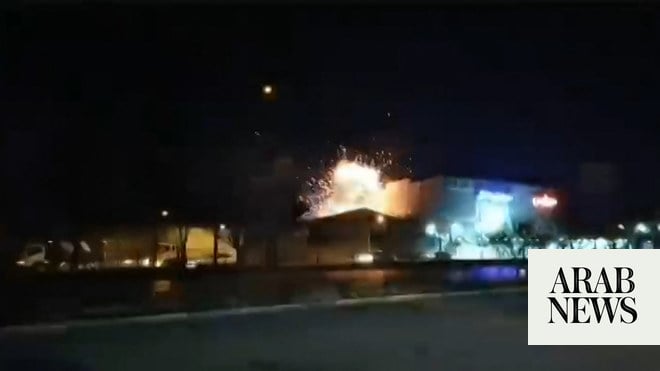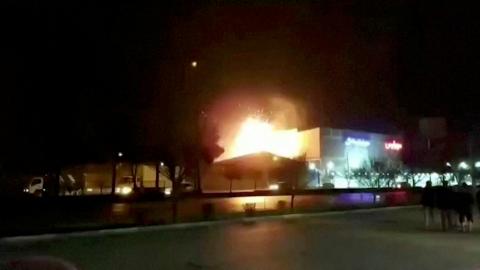
DUBAI (Reuters) - The website of Iran’s Supreme Leader on Friday carried the image of a golfer resembling former President Donald Trump apparently being targeted by a drone alongside a threat of revenge over the killing of a top Iranian general in a U.S. drone attack.
The image first appeared on a Persian-language Twitter feed that carried a link to Ayatollah Ali Khamenei’s website. Twitter took down that feed on Friday, saying it was fake.
Underneath the website picture were remarks by Khamenei in December ahead of the first anniversary of the killing of top military commander General Qassem Soleimani in Iraq, which was ordered by Trump.
“Both the murderers and those who ordered it should know that revenge may come at any time,” said the comments on top of the image, which showed the shadow of a drone looming over the lone golfer. Trump was not named.
U.S.-Iran tensions grew rapidly after 2018, when Trump exited a 2015 nuclear deal between Tehran and six world powers and reimposed crippling sanctions.
Tehran retaliated for Soleimani’s killing with missile strikes against U.S. targets in Iraq but the two sides backed away from further confrontation.
High tension and risk of war appeared to subside with the end of Trump’s term as his successor President Joe Biden, sworn in on Wednesday, has said Washington seeks to lengthen and strengthen the nuclear constraints on Iran through diplomacy.
Biden’s White House and the State Department did not immediately respond to requests for comment.
The top Republican in the U.S. House Foreign Affairs Committee, Michael McCaul, urged the Biden administration “to respond quickly and forcefully to this provocative threat against a former president” and called on Twitter to immediately and permanently suspend Khamenei’s account.
An official close to Khamenei’s inner circle said: “The aim (of the tweet) was to remind the gambler (Trump) that leaving office does not mean he will be safe and the assassination of our martyr Soleimani will be forgotten.”
“And now, American troops cannot protect him,” the official, who asked not to be named, told Reuters without elaborating.
Soleimani, the commander of Iran’s elite Quds Force, was responsible for clandestine overseas operations and was widely seen as the second most powerful figure in Iran after Khamenei.
Iran’s military and clerical rulers have said Tehran would choose the time and place of Soleimani’s revenge.
A Tehran-based analyst said the threat could be an end in itself: “The intention of the tweet seems to be keeping alive the spectre of revenge, which perhaps by itself is a kind of revenge.”
A Twitter spokeswoman said the @khamenei_site account was suspended for violating the company’s platform manipulation and spam policy, specifically against the creation of fake accounts. Asked if the @khamenei_site account was fake, she said it was.
Iranian officials were not immediately available to comment.
The golfer image tweet was retweeted by Khamenei’s main Persian-language account @Khamenei-fa, although it appeared to have been deleted later. The text and graphic of the tweet later carried by Khamenei’s official website (farsi.khamenei.ir) was also widely quoted by Iranian media.
Khamenei’s @Khamenei_fa account and his main Twitter account in English, which did not carry the golfer image tweet, were still operational.
Earlier this month, Twitter removed a tweet by Khamenei in which he said U.S.- and British-made vaccines were unreliable and may be intended to “contaminate other nations” for violating its rules against misinformation.
Exiled rights activists renewed calls for Twitter to ban Khamenei. “I hope the world can see how they (Iranian officials) can use social media to promote violence,” U.S.-based activist Massih Alinejad told Reuters.
Twitter permanently suspended Trump’s account following the Jan. 6 storming of the U.S. Capitol by some of his supporters, citing the risk of further incitement of violence.











